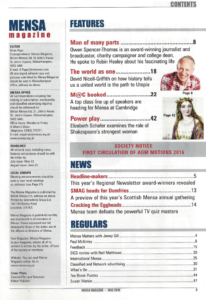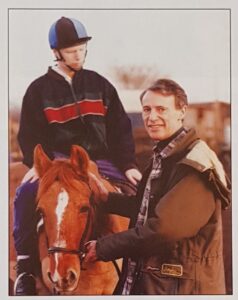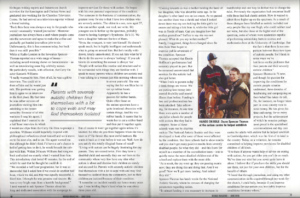Mensa People – Man of many parts
The following article appeared in Mensa Magazine in June 2016.
Robin Healey interviews Owen Spencer-Thomas

Although the Wikipedia entry for Owen Spencer-Thomas runs to ten pages, so eventful has been his life that you feel it could be a lot longer. The range of activities is impressive for this long-standing Mensan – from farmer student union president and priest to award-winning TV and radio broadcaster, national charity campaigner and fundraiser… and deputy dean at two Cambridge colleges.
The figures are equally impressive. Spencer-Thomas has raised £1.5 million for autism and given 1,400 talks to schools. The many honours which attest to his life of commitment and dedication include booming a Canon of Ely Cathedral, being awarded an MBE and receiving an honorary Doctorate of letters.
I first met Spencer-Thomas in August 1988 at my first Mensa meeting, when he was a reporter for Anglia TV. We had hardly shaken hands before he subjected me to a thorough grilling. Twenty seven years later, as he reminded me when I revisited him at his home in Cambridge, it was my turn to ask the questions. I began with his early life, which for a modern journalist is unusual enough. Far from taking the usual route of university followed perhaps by a spell as cub reporter, hospital radio broadcaster or postgraduate training course, Spencer-Thomas, for the first 23 years of his life, worked on his father’s farm in Braughing, East Hertfordshire, where he was born in 1940. This practical experience, I suggested, must have served him well for what lay ahead.
“It was certainly a good grounding. As a farmer you bring together a huge number of very different skills. You’re not someone who just tills the soil. You have to be a good veterinary scientist, a good engineer, you have to know soil chemistry, and you acquire so many other skills. Also, as a countryman you are much more a part of the community, which suited me. When I was a child I knew that if I was in trouble I could walk into any house and someone would tend to my needs. I would be safe. It’s so different from what I came to know in London and Cambridge. Also, I liked the idea of working in partnership with nature. You accept the condition of the land and you make the best of it by encouraging things to grow. I still enjoy gardening.”

Like many Mensan, Spencer-Thomas did not enjoy his time at school and at 17 he longed to leave. “I’d got my O levels and was not interested in doing A levels, so what else was there to do but help my dad on the farm? I did that for some years and enjoyed it very much, but then came the Sixties. This was a period in which people were drifting off the land to take up much better paid jobs in towns and cities. It struck me that farming had become not so much a community activity but a lonely one and I didn’t relish the prospect of sitting alone in a tractor cab, day in and day out for the rest of my life.
“I wanted to meet people, see the world, and also find a girlfriend. I also realised that leaving school after O levels and not pursuing A levels was a mistake. I had no idea back then that I had a high IQ but I did thirst after knowledge. By now I had left the farm and was flogging typewriters in London. Luckily this was quite remunerative and enabled me to get together enough money to take my A Levels. So I worked by day and studied in the evening, gaining A levels in Economics, British Constitution and the Elements of English Law. I then registered as student of sociology at Regent Street Polytechnic, which is now the University of Westminster.”
He had picked a very trendy subject to study, I suggested. “It was trendy back then but I never regretted studying sociology because it gave me a whole new perspective on society. You began to see the world in a very different way.
“If you are brought up in a fairly traditional agricultural community, as I was, you get very little idea of the tensions that exist in our industrial society, so all this was a wonderful preparation for all the seismic things that were to happen. There were the radical politics, which had never entered my head before. Pop music was changing rapidly, what we wore was also changing. There was Carnaby Street, where clothes would appear in bright reds, and blues, and purples and oranges.
“I was so fortunate to belong to the traditional agricultural society, able to recall how people ploughed their fields with a couple of horses, and yet be in this dynamic place called London.”
He was elected President of the student union but was he a political animal back then?
“I was interested in politics but was always a bit wary of extreme political views. I think both the extreme Right and the extreme Left are mirror images of each other. I didn’t like the intolerance they demonstrated.”
As president, Spencer-Thomas helped host some high profile events at the Poly’s Portland Hall. The Animals and Pink Floyd played there and in 1966 the Cream invited Jimi Hendrix to jam with them.
He also had an opportunity to flex his political muscles when, in December 1966, Anthony Crosland announced that fees for Commonwealth students were no longer to be subsidised by the UK. This measure, which was then as controversial as the student fee debacle was to become nearly 50 years later, angered many in higher education.
“This whole issue occupied the conscience of many students, both on campus and at a wider level. The NUS took up the case and it soon became obvious that college principals and academics were coming to the same conclusion. In the end, the government backed down.”
After graduating, Spencer-Thomas rejected the obvious choices open to those with a sociology degree and instead decided to study theology with a view to becoming a priest. He chose a two year course at Westcott House, which was affiliated to Cambridge University.
Why the priesthood, I wondered…
“On the face of it this seems quite a departure, but I had always been close to the church. It was part of my background. Church and farm had always been closely linked. I was church warden before I left to study at the Polytechnic. That link just carried on.”
After ordination he served his curacy for four years at St Luke’s Redcliffe Square in Kensington and it was while there that he developed an interest in journalism.
He began writing reports and features in church activities for the Kensington and Chelsea News and graduated into working for the Church Television Centre. He had arrived as a television reporter without a formal training.
“Back then there was always a way in for people who weren’t necessarily ‘trained journalist’. Moreover, journalism has always been a craft where people come into the newsroom and agree to make the coffee and gradually get handed journalism jobs to do.
Unfortunately, this is less common today, but back then it was still possible.”
What at Radio London in the Seventies Spencer-Thomas reported on a wide range of issues – including award-winning shows on homelessness – as well as interviewing some big celebrity names.
He particularly recalls, with affection, the Carry On actor Kenneth Williams.
“I really warmed to him. First of all, he was a gift to interview. You could sit in front of him and he would just talk. The problem was getting him to agree to an interview in the first place. By that time he was rather nervous of journalists tricking him into admitting his homosexuality. Because of all this wariness I rang his agent. I explained that I wanted to do a half hour interview in which I would use clips from the Carry On films to prompt a question. Williams would hopefully respond with philosophical reflections about himself and we’d move on to the next clip, and so on. His agent warned me that although he didn’t think I’d have a cat’s chance in hell of getting him to do it, he would broach the subject with him. Within 24 hours Williams had run me back and asked me exactly what I wanted from him. This introductory chat lasted 45 minutes, by the end of which he said that he thought he could do it.
“We recorded a half hour programme, but it was so successful that I asked him if he could do another half hour, which we did, and this was equally successful. I liked him. I thought he was genuine and sincere. He was a very bright man from a humble background.”
Parents with severely autistic children find themselves
with a lot to cope with and my find themselves isolated
I next wanted to ask Spencer-Thomas about his long and dedicated association with the campaign to improve services for those with autism. He began with his own personal experience of the condition.
“For someone in the business of communication, the greatest irony for me is that I have two children who are severely autistic. The oldest is a son, now aged 37, who can neither speak, nor read, nor write. My youngest son is further up the spectrum, probably closer to having Asperger’s Syndrome. He’s 31. We have a daughter between the two of them.

“Bryn, the youngest, is very into himself. He doesn’t speak much, but is highly intelligent and understands what is going on around him. But he’s totally withdrawn, totally unmotivated. If you ask him what he’d like to do the answer is always ‘nothing’. If you ask him do something the answer is always ‘no’.
“People with autism like routine and structure and to be surrounded with things they are familiar with. I speak to many parents whose children are autistic and I was talking to a woman just this morning whose son is seven years old. She was saying that her son likes her to cut up rubber bands. Apparently he has a passion for rubber bands.
Quite often those on the autism spectrum have a quite irrational obsession with certain things. And his was rubber bands. It seems that he wants her to cut a rubber band and then put it together again. But of course it won’t go together again unless it’s knotted. So what do you think happens when she ties a knot in it? He throws the most awful tantrum. He wants it back as it was before it was cut. Well, how do you satisfy this totally illogical frame of mind?
“Living with autism can be hugely frustrating for any parents. They are cursed twice. First they have a disabled child and secondly they are out there in the community where very few have any idea what autism is about and dismiss their children as unruly and uncared for. Parents with severely autistic children find themselves isolated from the community, just as their children are isolated because of their condition.
“I remember an incident outside our house many years ago. I was holding Bryn’s hand when he was about three years old.
“Coming towards us was a mother holding the hand of her daughter, who was about the same age. In the daughter’s other hand was an ice cream. As we passed one another there was a shriek and when I looked down there was my son holding the little girl’s ice cream and taking a lick from it, while the little girl was in floods of tears. Can you imagine how her mother greeted me? Suffice to say she was not pleased. What do you say to that mother?”
Surely, I suggested, things have changed since the film Rain Man began to improve public awareness of the condition. Spencer-Thomas accepted that Dustin Hoffman’s performance had certainly played its part. But he remained unconvinced that services for the autistic had also got better.
“When I talk to parents today I think things are worse. We are putting less money into mental disability and mental illness than before. Funding is less and professionalism has been attacked. Take schooling, for instance. At one time there were quite a number of specialist schools for people with autism. But they had to compete. Some of the schools were run by charities such as The National Autistic Society and they were developed to look after some of those worst affected by the condition. But these schools had to show results and you don’t get many positive results from severely disabled people. So what they did – and this I saw for myself as a member of the accreditation team – was to quietly move the more disabled children out of the school and replace them with the more able.
“As a result, the cry went up: they are passing exams now; they are doing this and doing that. Aren’t they good? Now we’ll get more funding. And indeed they did.”
Spencer-Thomas has harsh words for the National Autistic Society, whom he accuses of changing the parameters regarding autism.
“To attract funding it was necessary to increase its membership and one way to do that is to change the rules. Previously the organisation had concerned itself with those that had classic autism. Now it wanted to admit those higher up the spectrum. As a result of these changes those labelled autistic included not only people like my son Hugh, who could neither read, nor write, but also those at the higher end of the spectrum, some of whom were academics capable of performing astonishing feats in science and mathematics here at the University of Cambridge. But the fact is that there is no comparison between those two types of autistic people. So I think in some ways we’ve lost focus on the problems that face parents and their severely autistic children.”

Spencer-Thomas is 76 now, and though his passion for improving the conditions for autistic people remains undimmed, three decades of fundraising and campaigning on their behalf has taken its toll. He, for instance, no longer takes part in cross country runs to raise money. He has given his time and energy for so many projects, but the achievement of which he remains perhaps most proud is the specialised accommodation and day centre for adults with autism that he helped establish in Cambridgeshire, which was the first of its kind in the county.
Today, as a volunteer, he remains committed to helping improve provisions for disabled children of all kinds.
“I’m there if anyone needs help or advice on coping with autism. As you get older you can’t do as much. We’ve done our stint but you never quite leave it alone. I believe that if you have the skills you should use them, not just for your own children, but for the benefit of others.
“I found that through journalism, and using my other communication skills acquired through my work for the church, I could help, because if you improve conditions for one person, you inevitably improve conditions for many others.”
